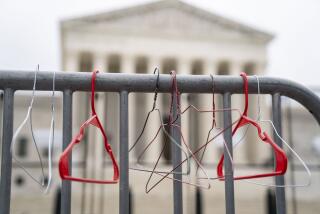Empathy, elections and justices
Today’s topic: How much of a mandate does President Obama have to structure the Supreme Court bench as he prefers?
Elections matter, but don’t expect the court to change much under Obama
Point: Erwin Chemerinsky
Presidential elections matter enormously in determining the composition of the federal judiciary, including the Supreme Court. Indeed, one of the longest-lasting legacies of any president is the judges he places on the federal bench. Justice John Paul Stevens, now 89 years old, was nominated for the high court by President Ford 34 years ago. If John G. Roberts Jr., now 54, remains on the court until he is 89, he will be chief justice in 2044.
Presidents, of course, do not have unfettered discretion to fill judicial vacancies; confirmation by the Senate is also required. Senate approval is more difficult when the president’s political party is not the majority. The last three instances of presidential picks being rejected by the Senate -- Robert Bork (nominated by Ronald Reagan), Clement Haynsworth and Harold Carswell (both nominated by Richard Nixon) -- involved Republican presidents and Senates controlled by Democrats.
A rejection by the Senate is highly unlikely when the president and the majority of the senators are from the same political party. The only avenue for the minority party to block a nomination is the filibuster. The Senate’s rules expressly provide for filibusters in requiring 60 votes to end a debate.
Although theoretically possible, filibusters of Supreme Court nominations are unlikely. They have virtually never occurred. Even when 46 Democrats voted against Clarence Thomas in 1991 and 40 Democrats voted against Samuel A. Alito Jr. in 2006, there was still no filibuster. Senate minorities considering a filibuster would have to keep in mind that the president may pick someone they’d like even less, and that at some point filibusters would be perceived as unfairly obstructionist and backfire.
Moreover, at this point, it would be very difficult for Republicans to filibuster without seeming like hypocrites. During the Bush presidency, Republicans strenuously argued that filibusters for judicial nominations were improper and each nominee deserves a vote. Republicans threatened to change the Senate’s rules to eliminate filibusters; ultimately there was a compromise that reserved the filibuster only for “extraordinary circumstances.” As part of that compromise, several very conservative Bush nominees for the federal court of appeals who had been blocked were confirmed.
All of this means that President Obama can have almost anyone he wants on the Supreme Court as long as Democrats hold a majority in the Senate. Also, practically speaking, he does indeed have a mandate because his decisive victory in November and his popularity give him great political capital to get his nominees confirmed.
The bottom line is that Sonia Sotomayor probably will receive easy confirmation. With 59 -- and probably soon to be 60 -- senators in the Democratic caucus, it is inconceivable that she could be stopped. In fact, Republican senators will need to think carefully before even strongly opposing her nomination lest they risk alienating Latino voters, an important and growing constituency.
But it is important to stress that Sotomayor was not nominated and will not be confirmed simply because of her race or the probable ease of her confirmation. She is impeccably qualified. She is a graduate of Princeton University and Yale Law School. She has experience as a prosecutor and a big-firm lawyer. She was a federal District Court judge nominated by President George H.W. Bush and a federal Court of Appeals judge nominated by President Clinton. No Supreme Court nominee in recent years has had more prior judicial experience. By all accounts, she possesses an extraordinary intellect and great ability as a judge.
Ultimately, though, a president’s ability to restructure the court is based on chance; it depends on how many vacancies occur during the president’s term. Nixon had four picks in his first two years and dramatically changed the direction of constitutional law. No vacancies occurred during Jimmy Carter’s presidency. It is expected that President Obama probably will have two more vacancies to fill, especially if he serves two terms. But even if justices Stevens and Ruth Bader Ginsburg retire in the next few years, this will not be enough to allow Obama to “restructure” the court because he probably will replace these justices with individuals of roughly the same ideology.
I want to thank you, Professor Somin, for participating in this exchange and The Times for inviting us to do this.
Erwin Chemerinsky is dean of UC Irvine School of Law.
It’s OK for Republicans to oppose Sotomayor
Counterpoint: Ilya Somin
Obama has the same mandate for his judicial nominees as any other president. In addition, the large Democratic majority in the Senate ensures that his nominees will almost certainly be confirmed.
That does not mean, however, that those with reservations about the president’s nominees and judicial philosophy must simply fall in line. Many Democrats, including then-Sen. Obama, opposed George W. Bush’s nominations of Roberts and Alito despite the fact that they knew there was little chance of defeating them. Obama realized that debates over Supreme Court nominations are part of an ongoing conversation over the proper functions of the judiciary. He was also correct to recognize that it is perfectly appropriate to oppose a nominee with strong professional qualifications if one has serious concerns about his judicial philosophy. For example, he voted against Roberts despite conceding that “there is absolutely no doubt in my mind Judge Roberts is qualified to sit on the highest court in the land.”
Judge Sotomayor is also a well-qualified nominee. However, some of her judicial opinions and other statements raise serious questions about her judicial philosophy that I summarized in my first post.
Last year’s election was not a referendum over Obama’s judicial philosophy. The Democrats prevailed primarily because of public anger over Republican mismanagement of the economy and the Iraq war. A recent poll shows that 33% of Americans believe that the current Supreme Court is “too liberal,” compared to only 23% who say that it is “too conservative” and 37% who believe it is about right. Thus, there is no clear national consensus behind Obama’s agenda for the courts. In any event, public opinion is a poor guide to judicial philosophy. Much of the public is ignorant of basic facts about the Constitution, and 57% cannot name a single current Supreme Court justice.
Although Sotomayor will probably be confirmed without much difficulty, her appointment is just the beginning of an ongoing debate over the administration’s vision for the federal judiciary. At this point, the president’s advocacy of the role of “empathy” in judicial decision-making is a key point of contention.
Unfortunately, Dean Chemerinsky, I don’t think you have sufficiently addressed the shortcomings of empathy-based judging that I pointed out in our Thursday exchange. Instead, you made many statements that I agree with, but which have only limited relevance to the issue in dispute. I agree that conservative justices (like liberals) sometimes base decisions on empathy and that judicial reliance on empathy cannot be completely eliminated. My position, however, is that such reliance is a negative rather than a positive -- whether practiced by liberals or conservatives. Still less do I dispute your claim that cases that come before the Supreme Court often don’t have easy answers (a point I noted myself). Finally, nothing I said fits your characterization of me as suggesting that “conservatives are impartial while liberals want decisions based on their preferences and sympathies.” I am not a conservative myself and I am not here to defend them. The real issue is not whether conservative and liberal judges sometimes rely on empathy, but whether we should strive to reduce such reliance or increase it.
One of the key differences between us concerns what judges should do in difficult cases. You contend that judges should decide such cases based “on their values, life experiences and empathy.” I believe they should focus primarily on the text of the law, history and relevant precedent, even if the meaning of the law is difficult to discern. For reasons that I elaborated on Thursday, it is particularly dangerous for judges to decide cases -- easy or hard -- on the basis of whatever empathy they might feel for the litigants. The fact that a case is hard doesn’t mean that channeling empathy will improve the quality of the decision.
A second important disagreement is over the question of whether judicial reliance on empathy can ever be reduced. It is true, as you say, that “all justices as human beings inevitably feel empathy.” That does not mean they must base legal decisions on it. Like other mature adults, good judges are capable of exercising emotional self-restraint and of recognizing that not all their natural impulses are appropriate grounds for making decisions. As I noted Thursday, history shows various examples where harmful judicial reliance on empathy has been reduced over time, even if it can never be completely eliminated.
The flaw in the president’s judicial philosophy is not his recognition that empathy can affect judicial decisions, but his belief that empathy-based judging should be encouraged rather than opposed.
In conclusion, I’d like to thank you, Dean Chemerinsky, for your thoughtful posts and The Times for organizing this discussion.
Ilya Somin, an assistant professor at George Mason University School of Law, blogs at the Volokh Conspiracy.
More to Read
A cure for the common opinion
Get thought-provoking perspectives with our weekly newsletter.
You may occasionally receive promotional content from the Los Angeles Times.






